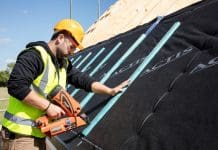Innovation funding specialist the MPA Group highlights the main advantages of modular construction and the key sector issues it is helping to address
Modular construction is the process where building components are produced in a factory, before being transported to the site for assembly. The pieces arrive already finished, minimising the amount of technical work required onsite.
It is not a new concept, but in recent years the method has seen a surge of popularity, with both housebuilders and policymakers starting to realise its potential to solve a number of the industry’s current challenges.
From reducing a project’s environmental impact to saving developers money, the benefits of modular construction are tangible. It’s why the UK government has set a target of building 100,000 such homes a year by 2020 – a substantial increase from the 15,000 currently constructed annually.
Solving the housing crisis
The government is well aware of the need to improve the current housing situation in the UK. A lack of available housing is driving up prices, making it incredibly difficult for first-time buyers to get on the property ladder.
To tackle this issue, Westminster has pledged that 300,000 new homes will be built every year by the mid-2020s. This is an ambitious target, with the number of new builds in 2017/18 standing at just 195,290. While this was 2% higher than the previous equivalent period, the growth rate before that was 15%, showing a slowdown in homebuilding.
To help meet its goal, the government is turning to modular construction. The method is reported to produce houses up to 30% quicker than traditional building practices, which could help developers meet their completion targets.
Such speed is possible for a number of reasons. Firstly, all of the components are created in a controlled factory environment, which is designed specifically to maximise efficiency. This is in contrast to the often unpredictable and hectic nature of building sites, which can reduce productivity.
Furthermore, if necessary, factory operations can continue 24/7 with less risk of people complaining about the noise and disruption.
Add in the fact that offsite construction is generally unaffected by the weather and other environmental delays and it’s clear how modular methods can knock significant time off completion dates.
Saving money and the environmental impact
Another challenge facing the property industry is the cost of building houses. In the first half of 2019, the average cost of building a unit increased to over £150,000, with rising material prices largely to blame. This is another issue modular construction is helping to address.
With properties being produced at a faster rate, both builders and the clients who commission the projects stand to make considerable financial savings. A shorter build time means reduced labour costs, while for commercial developments, it enables clients to start trading on the site sooner. An industry report cited by the government has also estimated that the actual practice of offsite production can reduce costs by 25% compared to traditional techniques, adding to the potential savings.
Modular construction also saves money by being environmentally friendly. Chapman Taylor reports that builders can reduce waste by up to 50% by using offsite methods. Companies are reducing the amount being sent to landfills and saving overspending costs.
Consumers also benefit from the environmental advantages of modular construction. With components made in well-designed and consistent factory environments, they are generally better insulated and more airtight than those created traditionally. This means that properties maintain heat better and people don’t have to spend as much on energy. It’s predicted that modular methods could reduce energy consumption by up to 20%.
Addressing the skills shortage
Finally, modular construction is helping to tackle the property sector’s worrying skills shortage. As well as having a notoriously ageing workforce – just 12% of construction workers are under the age of 24 – the industry is heavily reliant on overseas workers, who may find it more difficult to work in the UK once the country leaves the European Union. These factors mean that there simply isn’t enough staff to keep up with the demand for new houses. Modular construction helps to solve this issue by reducing the number of skilled workers required.
While such specialised staff members are still needed in the offsite factories, far fewer are needed at the actual developments, as once the components reach that stage of the process, the only task left is assembly. The technical workers can remain in one central location, with no need to visit the individual sites.
The future of housebuilding
The property sector is enormously important to the UK economy, with a market value of over £1,600bn – 7% of GDP. A healthy property industry means a healthy economy and that is why the government is so motivated to fix the issues it currently faces.
Modular construction is one of its proposed solutions, with the method cited in the government white paper Fixing Our Broken Housing Market as one of the main ways of tackling the crisis. The report explicitly states that there will be support for offsite manufacturing techniques, with efforts made to ensure such projects can access adequate funding.
The government is clearly committed to improving the country’s housing situation and is encouraging any form of innovation that could help tackle the issues. The R&D Tax Credit scheme is one example of this, with innovating companies able to claim back a proportion of their R&D investment in the form of tax credits.
MPA Group is exhibiting at Advanced Engineering 2019 and can be found at stand C14 in the Automotive Engineering section.
Mike Price
Director
The MPA Group
Tel: +44 (0)808 2085221















